AVESCURRICULUM
Our curriculum's design is research-based, drawing on the works of influential educators such as Maria Montessori, Lev Vygotsky, and the inspirational schools in Reggio Emilia, Italy.
Fun Family Phonics
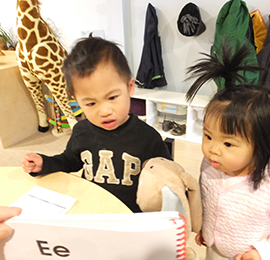
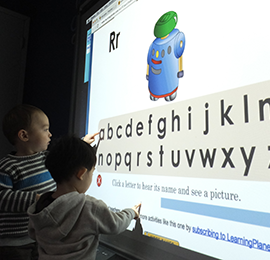
For children 3-4 years old, Fun Family Phonics is a pre-reading program that makes learning letters and their phonetic sounds interactive, engaging, and most of all, fun. You will be amazed at how much your children enjoy learning to read and how quickly they learn to do it. This program has been designed to appeal to children of all learning types including visual learners, auditory learners, and tactile learners. Every student at Aves' goes through the Fun Family Phonics program with our Head Teacher, who is a certified Fun Family Phonics Tutor. At the end of this program, children will have a strong literary foundation to use and excel with in their academic life.
Strategic Thinking
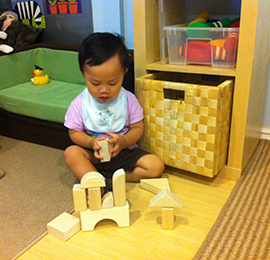
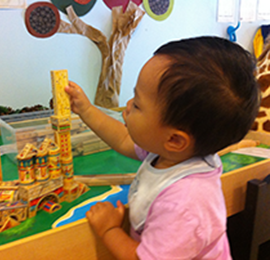
Strategic Thinking is a module inspired by the works of educators Maria Montessori and Lev Vygotsky. It is a sensory-based module where children are encouraged to think, feel, and experiment with their surroundings. Children are presented with different social problems requiring them to think critically and to come up with innovative solutions using the materials presented to them.
Given the nature of the social problems presented, Strategic Thinking promotes and develops pro-social attitudes and behaviours in children. Children learn how to be altruistic to others. In addition, children develop their problem-solving skills, think strategically, and learn to work in a team with others.
Creative Corner
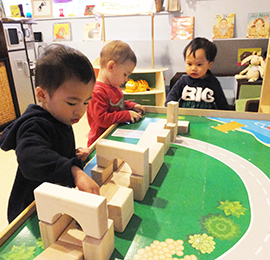
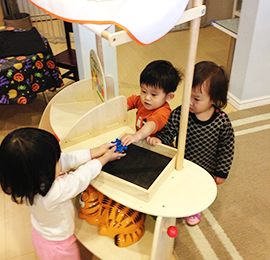
Creative Corner is a module inspired by the world-renown schools in Reggio Emilia, Italy. During this module, children's interests are pursued and their ideas are turned into reality. For example, if children express interest in bridges, the teacher will encourage them to think more deeply about the topic. What are bridges used for? How are they built? How are they relevant to our lives? What bridges exist in my community? Children will be encouraged to research these questions using books and media sources. During their research, children are encouraged to apply the knowledge they have learned to a real-life situation. In the case of the bridges, children would be asked to build a bridge using a variety of different materials and to determine which material was most effective. As one can see, Creative Corner is a child-directed module. It is when children's thoughts and ideas are truly heard and extended for a holistic learning experience.
Creative Corner provides children with the opportunity to develop important academic skills such as creative and critical thinking, communication, as well as cooperation and teamwork skills.
Meaningful Math

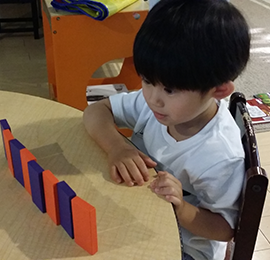
Meaningful Math is a module created by our Head Teacher that capitalizes on Aves philosophy of "Make Learning Meaningful to Children". It has been created for children 2.5-3 years of age and will help them learn how to recognize, write, and understand one-to-one correspondence for numbers 1 through 100. Like Fun Family Phonics, Meaningful Math uses stories and beautiful illustrations to captivate children's attention and uses interactive games to help children consolidate the numerical information they have learned. .
Mini Sports Program
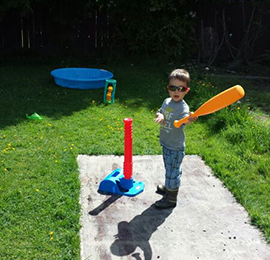
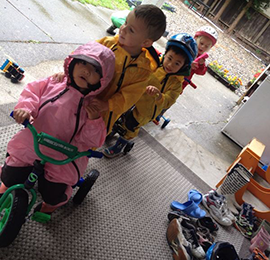
Exercising and developing an active lifestyle is key to being and staying healthy. In our mini-sports program, children develop fundamental skills needed for team sports play. We stretch, warm-up, as well as work on specific skills and drills to foster and develop children's gross motor competency. When these skills are mastered, children are exposed to team sports such as soccer, baseball, and basketball where they learn simplified game rules, learn how to be a team player, as well as learn good sportsmanship.
History and Cultural
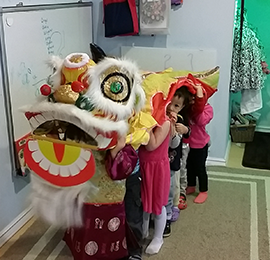
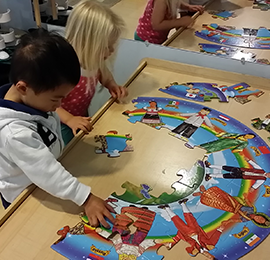
As a multicultural society, one of our major focuses for children at Aves is guiding them to learn, understand, and respect cultural diversity. Research has shown that in order for children to truly appreciate other cultures, comparative experiences should be provided. Celebrating a particular day and eating ethnic foods is often not enough for children to really understand what a cultural is about. For example, having a Chinese New Year celebration and eating Chinese Food for a few days does not showcase to children what the Chinese culture is or what it involves. Rather, comparative experiences are needed and they should be consistently taught throughout the school year, which is precisely what Aves does for its students.
Home Cooked Meals
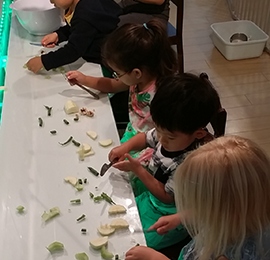
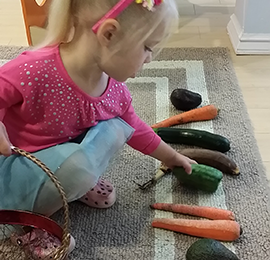
Being able to optimally focus, attend, learn, and grow requires children to eat healthy and nutritious foods throughout the day. Aves follows the Canadian Food Guide and provides children with delicious, fresh, home-cooked healthy meals that have been created and approved by a certified nutritionist. Each child's daily food and drink intake will be logged for parent's convenience. In addition, to further ensure that each child is acquiring the recommended daily intake of food, parents will be notified as to what their child's remaining daily intake of fruit, veggie, dairy (or alternative), meat (or alternative), and grain is each and every day.
In addition to providing healthy meals to our students, mealtimes are considered an optimal time for learning a multitude of important life skills. Children will be taught the following skills during morning snack, lunch, and afternoon tea:
• Etiquette (i.e., table manners)
• Responsibility (i.e., setting up the table, cleaning up after oneself)
• Self-regulation (i.e., remaining seated at the table until mealtime is finished)
• Language Fluency
Health and Nutrition
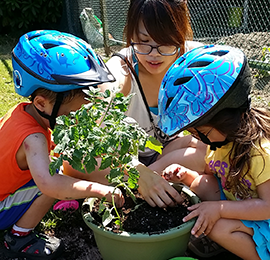
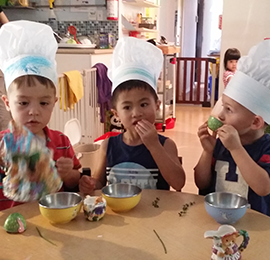
At Aves, we believe that in order for children to develop healthy attitudes towards food and nutrition, they need to have hands-on experiences. As such, children will be involved with planting, growing, and harvesting their own fruits and vegetables from our school garden. In addition to learning about where food comes from, children will be taught what foods are considered healthy and why healthy foods are important for our bodies. Children are also given the opportunity to apply and consolidate their health knowledge during our hands-on cooking experiences. Children will learn how to make healthy snacks and lunches as well as develop their fine motor skills.